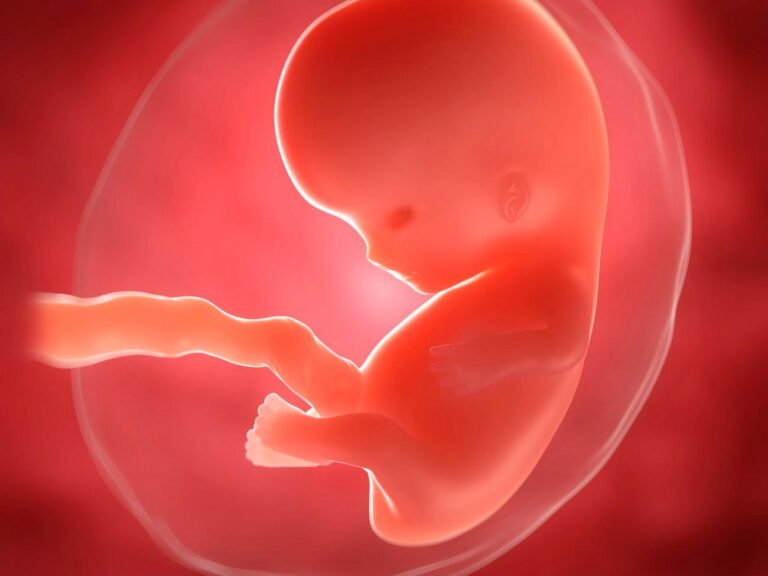8 Weeks Pregnant: Pregnancy Symptoms & Baby Development
Read time: 4 minutes
8 weeks pregnant is how many months?
Month 2 (Trimester 1)
Baby development at 8 weeks
Your baby’s facial features are becoming more defined.
Morning sickness
Learn how to ease the queasiness of morning sickness that may have started.
Zinc
Discover how zinc supports your baby’s cells and which foods are good sources.
Baby development at 8 weeks

What does my baby look like? And, what size is my baby?
By the time you’re 8 weeks pregnant, your baby is roughly 1.6cm long1. At this stage, their newly formed jawbone gives more definition to their tiny mouth, and the tip of their nose is now visible, featuring two distinct nostrils.
Internally, cartilage is being replaced by bone cells and joints2, and their legs are growing longer, although it’s too early to see knees and upper or lower legs yet.
At 8 weeks, your baby is medically called a foetus, which is Latin for young one or offspring.
Incredibly, they are already starting to make small, jerky movements as their muscles begin to function. It will be several weeks before these are strong enough for you to notice
Pregnancy at 8 weeks (first trimester)
Body changes
At 8 weeks pregnant, you may start to notice the first signs of your pregnancy bump showing, but this isn’t the case for everyone. At this stage your womb is still within the pelvis and below the pubic bone, so you can’t feel it when pressing your tummy. However if you have had a baby before, your tummy may look pregnant even at this stage as the muscles and ligaments have been stretched before.
Pregnancy symptoms at 8 weeks

Early pregnancy symptoms vary from person to person. At 8 weeks, you may experience any of the following signs of pregnancy, or no symptoms at all:
Breast tenderness
Your breasts may become larger and feel sore. You may also find your nipples stick out more than usual and darken in colour as your body begins to prepare for breastfeeding.
Tiredness and fatigue
During the first 12 weeks, hormonal changes can leave you feeling tired or exhausted.
Nausea and vomiting
Morning sickness affects up to 80% of mums-to-be in the first trimester6. It can strike at any time of the day or night and varies from mild nausea to sickness throughout the day.
Bloating and gas
The pregnancy hormone progesterone slows down your digestion which can lead to bloating and constipation as well as excess gas.
Cramping or
bleeding
Light cramping and spotting are common in the early stages of pregnancy8,9. If the pain becomes severe (stronger than period cramps) or if bleeding becomes heavy, you should talk to your GP.
Frequent urination
Frequent trips to the bathroom are one of the most common symptoms of early pregnancy, as your growing uterus begins to put pressure on your bladder and your circulating blood volume increases.
Mood swings
Pregnancy hormones, oestrogen and progesterone, soar during the first 12 weeks of pregnancy10, affecting how you’re feeling emotionally. Get plenty of rest and light exercise to keep you feeling like yourself.
Feeling queasy?
Morning sickness affects two out of three pregnant women during early pregnancy. It can occur at any time, day or night and is usually at its worst around week 8. By 16 to 209 weeks most mums are relieved to feel the symptoms fade.
Some mums-to-be experience morning sickness beyond the first trimester, and queasiness may come and go throughout pregnancy.
It’s worth remembering that nausea is usually a sign of a healthy pregnancy.
Try these suggestions to ease your symptoms:
Get a good night’s sleep and plenty of rest during the day.
Eat a dry cracker, toast or plain biscuit before getting out of bed.
Eat little and often to keep something in your stomach.
Drink plenty of fluids.
If drinking is proving difficult, ice lollies, ice cubes or simply sips of whatever you can stomach will keep you hydrated.
Include ginger in your diet, either as a freshly infused tea or non-alcoholic ginger beer.
Try motion sickness bands. They are worn on the wrist and positioned to press on an acupuncture point.
Some women find acupuncture helpful.
If you are taking anti-sickness medication, take the first dose 30miniutes before you get out of bed in the morning.
Bear in mind that your body may respond differently on different days. Keep experimenting and if you’re concerned that you’re not eating or drinking enough because of your nausea, let your midwife or GP know.
Stock up on zinc
Zinc plays an important role during your pregnancy. Try to include the following foods in your diet to top up your intake:
- Zinc-fortified cereals
- Red meat such as beef and lamb
- Poultry, especially turkey
- Wholegrain bread and cereals
- Nuts
- Milk, cheese and eggs
The
Science
Behind
ZINC
Powered by Nutricia
Zinc supports the body on a cellular level, playing a role in constructing, dividing and protecting cells, as well as normal immune function and vision. It also contributes to normal cognitive development, reproduction, fertility and bone health. A healthy, balanced diet is likely to provide all the zinc you need. While most prenatal multivitamins contain high levels of zinc, it’s wise to eat food sources too. The Reference Nutrient Intake (RNI) of zinc for women of childbearing age is 7mg per day.
